World’s Oldest Moon Map Carved Into Ireland’s 5,000 Year-Old Tomb At Knowth
Ellen Lloyd - MessageToEagle.com - Our search for the truth about the origin of Man takes us to Ireland, once the home of the Tuatha De Danann.
County Meath, Knowth. Image credit: Markiemcg1 - CC BY-SA 4.0
In Ireland, Dr. Philip Stoke of the University of Western Ontario, Canada discovered the world's oldest moon map.
Dr. Stoke's primary task was to prepare maps of asteroids based on spacecraft observations, but he also constructed detailed maps of the Moon.
One day he was puzzled that there were no recorded maps of the Moon older than 500 years.
Before his discovery, the oldest known Moon map was by Leonardo da Vinci drawn about 1505 A.D.
"I simply could not believe this. I felt there just have to be an older map somewhere," Dr. Stoke said.
He began looking through old manuscripts and history books. His search led him to Neolithic sites in the British Isles.
From ancient sources, he learned that the inhabitants of Ireland were regularly visited by the great god Apollo. There was also an obvious yet overlooked connection between Ireland and the Moon.
Eastern Passage, Knowth, Co. Meath. Image credit: Przemysław Sakrajda - CC BY-SA 3.0
In his "Island of the Hyperboreans," the historian Diodorus Siculus wrote "… there is also on the island both a magnificent sacred precinct of Apollo and a notable temple which is adorned with many votive offerings and is spherical in shape…
They say also that the Moon, as viewed from this island, appears to be but a little distance from the Earth and to have upon it prominences, like those of the Earth, which are visible to the eye. The account is also given that the god visits the island every nineteen years…"
Many ancient tombs and stone circles are known to be aligned with the Sun, but what about the Moon? Was the Moon not equally important to the people of the ancient world?
Soon, Dr. Stoke could identify several lunar alignments that scientists seemed to pay little attention to.
Then, he made his incredible discovery of the world's oldest Lunar map.
It was carved into a rock in one of Ireland's most remarkable prehistoric tombs at Knowth, County Meath.
The Knowth site contains more than a third of all the known megalithic art from the Neolithic period. It was built by stone age man and is the largest of all passage graves in the Brú na Bóinne complex. The site consists of one large and 17 smaller satellite tombs. The passage tomb at Knowth is estimated to be about 5,000 years old.
"I was amazed when I saw it. Place the markings over the picture of the full Moon and you will see that they line up. It is without doubt a map of the Moon, the most ancient ever found.
It is all there in the carving. You can see the overall pattern of the lunar features, from features such as Mare Humorun through to Mare Crisium," Dr. Stoke said.
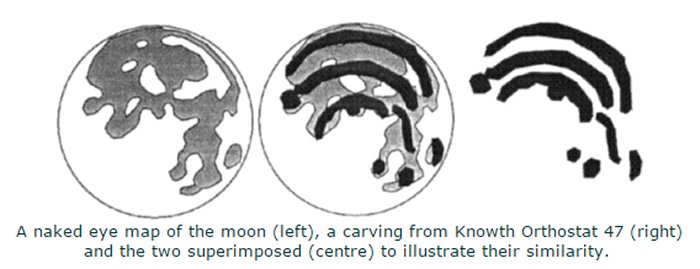
The stone with this unique carving was named Orthostat 47. The Knowth map is ten times older than da Vinci's Moon map.
Up to now, over 200 decorated stones have been found during excavations at Knowth.
The Knowth passage tomb is unique in having two passage graves on each side of the mound. Examination of the Knowth passage shows that the tunnels once lined up with the solar solstices. At certain times moonlight could shine down the eastern route of the tomb. When it happened, the moonlight fell on the Neolithic Lunar map.
The Stone Age people who built the Knowth site must have had a sophisticated understanding of astronomy.
"The people who carved this Moon map were the first scientists. They knew a great deal about the motion of the Moon. They were not primitive at all. Without using sophisticated mathematics or fine angle measurements, these Neolithic astronomers were able to observe, depict, and hypothesize about the Moon and its motions. These are actions of scientists," Dr. Stoke said.
Yet, archaeologists and historians keep referring to Stone Age people as a primitive race.
Written by - Ellen Lloyd – AncientPages.com
Updated on October 10, 2022
Copyright © AncientPages.com All rights reserved. This material may not be published, broadcast, rewritten or redistributed in whole or part without the express written permission of AncientPages.com
More From Ancient Pages
-
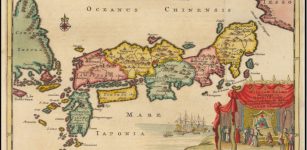 Spread Of Transeurasian Languages Was Due To Agriculture Study Reveals
Archaeology | Nov 10, 2021
Spread Of Transeurasian Languages Was Due To Agriculture Study Reveals
Archaeology | Nov 10, 2021 -
 Sobek: A 2,500-Year-Old Mummified Nile Crocodile – On Display At The British Museum
Archaeology | Dec 9, 2015
Sobek: A 2,500-Year-Old Mummified Nile Crocodile – On Display At The British Museum
Archaeology | Dec 9, 2015 -
 King Charles II Of England Banned Coffeehouses In 1675
Ancient History Facts | Jun 18, 2018
King Charles II Of England Banned Coffeehouses In 1675
Ancient History Facts | Jun 18, 2018 -
 2,000-Year-Old Celtic Dice Discovered In Poland
Archaeology | Oct 11, 2023
2,000-Year-Old Celtic Dice Discovered In Poland
Archaeology | Oct 11, 2023 -
 Ancient City Of Koh Ker Was Occupied Much Longer Than Previously Thought
Archaeology | Oct 12, 2018
Ancient City Of Koh Ker Was Occupied Much Longer Than Previously Thought
Archaeology | Oct 12, 2018 -
 Unique Viking Age Shipyard Discovered At Birka Challenges Maritime Activities Of The Viking Age
Archaeology | Jun 16, 2022
Unique Viking Age Shipyard Discovered At Birka Challenges Maritime Activities Of The Viking Age
Archaeology | Jun 16, 2022 -
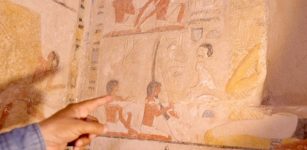 Largest And Most Complete Ancient Egyptian Workshops Found In Saqqara
Archaeology | May 28, 2023
Largest And Most Complete Ancient Egyptian Workshops Found In Saqqara
Archaeology | May 28, 2023 -
 Glass Technology Was Known In Sahara Centuries Before The Arrival Of Europeans
Ancient Technology | Jan 20, 2018
Glass Technology Was Known In Sahara Centuries Before The Arrival Of Europeans
Ancient Technology | Jan 20, 2018 -
 Europe’s Largest Predatory Dinosaur Unearthed On The Isle Of Wight
Archaeology | Jun 11, 2022
Europe’s Largest Predatory Dinosaur Unearthed On The Isle Of Wight
Archaeology | Jun 11, 2022 -
 William The Conqueror: Ruthless And Powerful Ruler Who Changed Britain Forever
Featured Stories | Feb 25, 2023
William The Conqueror: Ruthless And Powerful Ruler Who Changed Britain Forever
Featured Stories | Feb 25, 2023 -
 Morgan Le Fay – Heroine, Goddess, Witch, Fay, Or A Sorceress In Arthurian Traditions
Celtic Mythology | May 28, 2023
Morgan Le Fay – Heroine, Goddess, Witch, Fay, Or A Sorceress In Arthurian Traditions
Celtic Mythology | May 28, 2023 -
 Oldest Door Lock Comes From Ancient Egypt
Ancient History Facts | Jun 27, 2018
Oldest Door Lock Comes From Ancient Egypt
Ancient History Facts | Jun 27, 2018 -
 Unusual Biblical Cloud – What Was This Perplexing Atmospheric Phenomenon?
Biblical Mysteries | Feb 22, 2019
Unusual Biblical Cloud – What Was This Perplexing Atmospheric Phenomenon?
Biblical Mysteries | Feb 22, 2019 -
 Discovery Of Stone Age Textiles Sheds New Light On The History Of Clothes Making
Archaeology | Nov 9, 2021
Discovery Of Stone Age Textiles Sheds New Light On The History Of Clothes Making
Archaeology | Nov 9, 2021 -
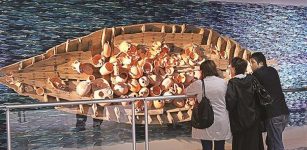 Yenikapı Shipwrecks – A Unique Historical Treasure That Sheds Light On Ancient Ship Production
Archaeology | Oct 28, 2015
Yenikapı Shipwrecks – A Unique Historical Treasure That Sheds Light On Ancient Ship Production
Archaeology | Oct 28, 2015 -
 How Did Native American Indian Chiefs Get Their Names?
Ancient History Facts | May 27, 2016
How Did Native American Indian Chiefs Get Their Names?
Ancient History Facts | May 27, 2016 -
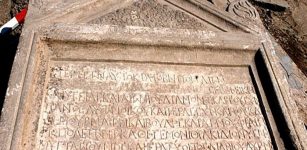 Third-Century Inscription Related To Dionysus Cult – Discovered
Archaeology | Jul 16, 2019
Third-Century Inscription Related To Dionysus Cult – Discovered
Archaeology | Jul 16, 2019 -
 Horses In Florida Did Not Travel Far Distances – New Study Suggests
Archaeology | Jan 3, 2019
Horses In Florida Did Not Travel Far Distances – New Study Suggests
Archaeology | Jan 3, 2019 -
 Pharaoh Ramses II’s Sarcophagus On Display For The First Time In 50 Years
Artifacts | Apr 11, 2023
Pharaoh Ramses II’s Sarcophagus On Display For The First Time In 50 Years
Artifacts | Apr 11, 2023 -
 Mediterranean Sea Was Hotter 2,000 Years Ago And Contributed To The Fall Of The Roman Empire
Archaeology | Jul 27, 2020
Mediterranean Sea Was Hotter 2,000 Years Ago And Contributed To The Fall Of The Roman Empire
Archaeology | Jul 27, 2020


